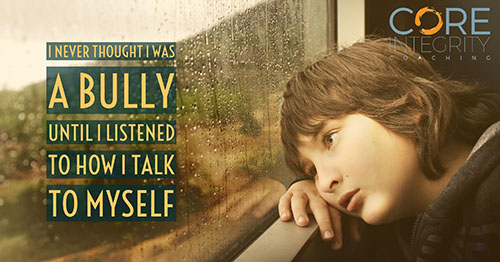Failures, mistakes, embarrassing fumbles – we’ve all been there. We’ve all found ourselves in that agonizing moment of realizing that we just put our foot in it… or made a thoughtless error… or got rejected… or failed to produce our intended result – or, or, or… the list goes on.
These things happen to all of us. We stumble, fumble, trip and fall – sometimes flat on our faces. The differentiator is this: When you’re lying there in the dirt, what do you say to yourself?
How do you respond when you fumble or fall?
Are you gentle, understanding, encouraging? Do you immediately step back and remind yourself of the bigger picture and your many talents and good qualities? Do you recognize that this moment, while immediate and perhaps painful, is not forever? After all, “This too shall pass” can be deep wisdom in moments like these.
 Or do you perhaps slip in a jab or two about what a pathetic, stupid loser you are? A kick in the ribs (as long as you’re already down) about how it’s no wonder no one likes you and you can’t get anything right and what did you expect, anyway?
Or do you perhaps slip in a jab or two about what a pathetic, stupid loser you are? A kick in the ribs (as long as you’re already down) about how it’s no wonder no one likes you and you can’t get anything right and what did you expect, anyway?
Have you ever used the phrase “I’m such an idiot!” and meant it? If so, you’re far from alone. Have you heard the quote “I never thought I was a bully until I listened to the way I talk to myself”? I was unable to source the quote, but then realized that perhaps it’s better that way, since it’s so universal a sentiment.
Another option for when we fall
If we stop for a moment in that moment to recognize what we’re doing and saying to ourselves, we can take that opportunity to ask ourselves a few key questions:
- Is this how I would treat someone I care about who was in this situation? What would I say if this had happened to a child?
- What is the way I’m speaking to myself accomplishing? What is the goal? What result is this self-treatment intended to produce? Is it effective?
- What are some other options here?
My own journey toward gentleness – the importance of baby steps
I used to beat myself up constantly about a whole bunch of things. I don’t know exactly when that changed for me – I suspect it was gradual – but I’ve been thinking about it a lot lately because it seems to me to be an important journey to dissect, understand, and share. In fact, I didn’t even realize how infrequently I now speak harshly to myself until recently, when I took a new baby step toward my lifelong goal of having a healthy, strong body.
This “goal” has been an ongoing initiative for me for more than three decades, so a lot of steps have already been taken along this path – many of them teeny, some of them backwards or sideways, but all of them useful learning opportunities. I recognized many (many!) years ago that this journey would be incremental. This style of approach was (and is) necessary for me because, among other things, I have a defiant streak that resists authority and restrictions. As a result, I’ve never been able to diet without messing myself up psychologically.
So I’ve spent years introducing one small health-related shift at a time, each one an experiment in shaping what are intended to be lifelong habits of healthy eating and exercise.
In making this latest shift, which happened to be cutting out sugar and flour in favor of whole foods, I recognized that steps like this, which might have seemed extreme to me 20 – or even two! – years ago, are now merely the next logical step occurring naturally at this stage on my journey. After all, you’re not ready until you’re ready – and at that point, you’re ready.
Another key element
In the process of introducing this new habit for myself, which was unusually challenging because it also required me to recognize (and admit!) that sugar was a trigger for me (remember that defiant streak eager for freedom from restriction?), I had a friend ask me the secret to getting from there (where I started out however many years ago) to here (where I currently am). In answering her, I cited not only the necessity of taking baby steps – which is a major factor – but also the way that I treat myself.
If I slip or fail or binge along the way, it is not the end of the world or an excuse to berate myself. My practice these days is to simply be present and aware of what I’m doing and why. I don’t fight with myself about it. I also noticed that I don’t hate myself during or after. When my friend asked for my differentiator – what made it possible for me to successfully make these shifts – this refusal to hate myself struck me as key.
Instead, I skip straight to looking upon myself with compassion, viewing myself as someone doing the best she can with what she has to work with in that moment. And I get curious – gently curious – about what that is and how it’s all playing out.
How this translates to daily life
Similarly, when I do or say something embarrassing, or make a mistake, or realize I’m acting out of alignment with my values or the sort of person I want to be, I consciously work on being aware of how I talk to myself.
As part of my coaching practice, I regularly help others with this challenge of self-talk, and it has made me even more aware of my own. As we become aware of how we treat and talk to ourselves in those vulnerable moments, we have several choices:
- I can fall down the rabbit hole of self-recrimination and then deal with the internal aftermath.
- I can get in an argument with myself and beat myself up for beating myself up.
- I can recognize that what I just did or said to myself is a reaction to being embarrassed, scared, hurt, frustrated, or disappointed… and let it go.
That last one has an added layer of benefit, in that it allows us to shift our focus toward taking care of the underlying emotion/cause and thus stopping the cycle. Of course, the glorious challenge there is discovering – and in many cases admitting – what that is in the first place. Much more interesting than self-flagellation any day of the week!
The practice and habits essential to moving forward
After developing the habit of self-awareness, the next habit to learn on this particular journey is how to be gentle with oneself – and others. And alongside that habit is another equally important one: learning to let go so we can move on. Sometimes getting unstuck means releasing our own grip on something we’ve been holding so long we don’t even realize we’re still attached to it.
In my experience, this practice and approach represent the only true path forward. Much of the journey is made up of incremental baby steps . . . and time spent face down in the dirt after a fall – I mean learning opportunity. The moment we make that connection – that stumbles and falls are part of the process, and perhaps represent some of our most meaningful and essential opportunities – is the moment we begin to truly appreciate the journey.
This article is part of what I’m thinking of as my “Discomfort Series.” Why a Discomfort Series? I’m a big believer in self-awareness, and taking a mindfulness approach toward life means coming to a place of peace with our full range of human emotions, including the uncomfortable ones. In this series, I plan to take a look at some of the emotions and experiences that can give us a hard time when it comes to truly being our whole self. I welcome your feedback and input as I develop this series! Please drop me a line any time.



